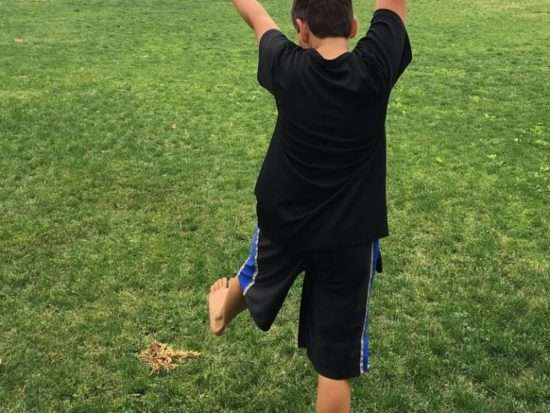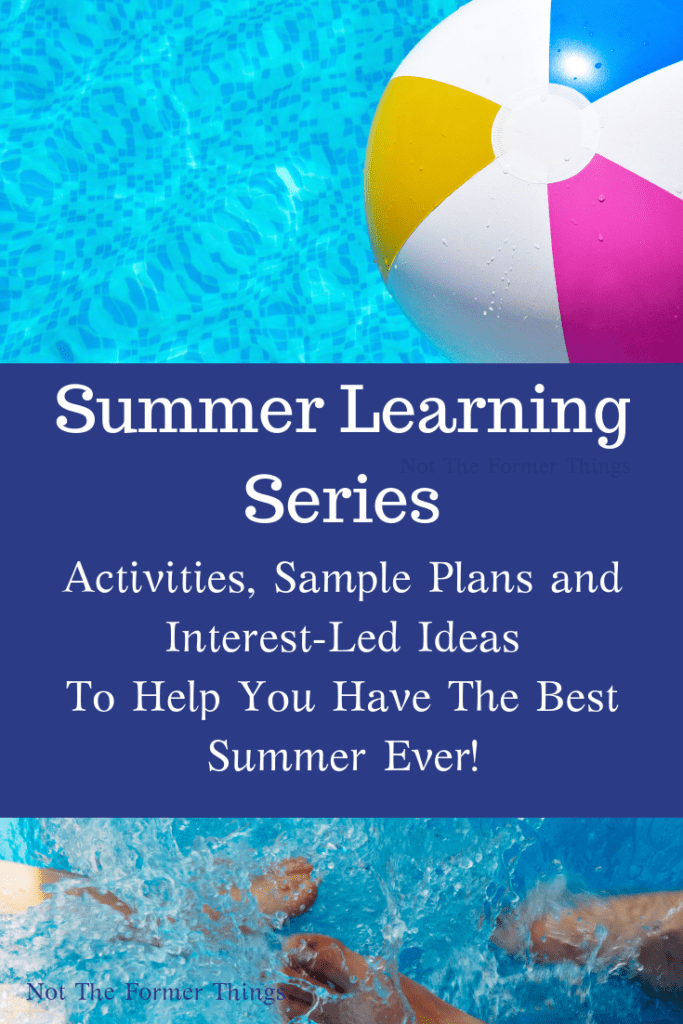Written by Shawna Wingert of Not the Former Things
I don’t call us year-round homeschoolers.
(More in protest than anything else.)
The truth is, we do learn year-round. But that title just sounds so sad. No summer vacation. No days at the beach. No feeling of excitement when late August rolls around and it’s time to begin anew.
No, instead of year-round homeschooling, we employ something just a little bit different.
We have our regular school year. Then we have what I have come to refer to as “summer learning.”

Our first few years of homeschooling, I tried to take the entire summer off.
I wanted my kids to experience the same joy I felt, knowing that school was out for the summer. The endless stretches of time, the lazy afternoons, the sprinklers, the joy.
Turns out, my boys respond pretty poorly to endless stretches of time and no predictable plan.
After three years of summer vacations, I began to dread summer. After four, I decided I needed to create a summer learning plan that met all of our needs – a break, a nod to the more relaxed days of summer, but with structure and the predictability my children crave.
Turn out, summer learning is one of the best things I have ever done for our homeschool.

How Summer Learning Can Make Your Entire School Year Better
I have come to see summer learning as essential to our overall homeschooling plan and progress. Here’s why:
Trying New Things
Summer is the perfect time to try new things in our learning. I am sure this is more a psychological thing, but it feels like there’s a lot less at stake. I am more willing to throw caution to the wind and see what happens if we only study Harry Potter all summer-long.
Because I have been willing to try something new, I have learned so much about what really works for my kiddos. The trial and error I allow myself in summer is invaluable.
Confidence Building (for all of us!)
Because our summer learning plan has a much shorter time frame associated with it, I find that we all feel such a sense of accomplishment as we work through it.
For me, planning is easy and implementation is much more straight-forward than a September introduction to a year-long curriculum. For my boys, they feel a more immediate sense of accomplishment and completion.
Easier Transition Back To School
Perhaps most surprising has been how easy this approach makes our transition back to school in the fall. We are rested, because our summer learning plans typically require less and allow us more freedom. We are still in a functional routine, which makes a return to our usual days that much easier.
Our summer learning actually prepares us for our learning throughout the school year.

I am really looking forward to our summer learning this year.
Would you like to join me in creating a plan that works? I am sharing all my best tips and tricks for summer learning, as well as a real life look at our summer learning plan as part of this four week, email only series. I would love to have you come along for our summer!
What are your learning plans for this summer?
If you enjoyed this post, check out Jamie’s newly release book, Introverted Mom: Your Guide to More Calm, Less Guilt, and Quiet Joy.



 Weekend homeschool links
Weekend homeschool links
We are finishing up our school year tomorrow! I plan on taking off the rest of May and all of June. We will continue to do Bible and a family read-aloud in the mornings. We will start back with a full schedule in July to take advantage of counting library programs and swimming to get our hours in. My plan is to do a sabbath schedule where we take a break every few weeks and end our school year at the end of April.
We live in Kentucky and I think the best months to be outside are May and June. In July and August it’s too hot to play outside, so we might as well do school and be able to take more time off when the weather is nicer.
We just moved to KY.
That is a summer plan, in and of itself! Good Luck with the move. 🙂
I love everything about this! We strive for low stress school because anything else just fires up my daughter and the fights begin…no good for any of us. Taking a more relaxed approach with lots of review and gentle shared learning has helped us immensely. I had originally planned to take the whole summer off from any formal schooling due my job requirements but a job change has opened my schedule back up and I think we’ll continue with a three day school week after taking next week and the first week of June off. Excited to see your summer planning emails! TIA!
Your summer plan sounds perfect! Thank you for sharing.
I tried to sign up for the four week summer ideas but there is not a sign up icon after you enter your name and email.
Hi Jessica,
I am so sorry. It’s all fixed now (technology is not my gifting…:-)
Here is a direct link to the sign-up and I am excited to work with you on our summer plans!
https://pages.convertkit.com/c8baa6ac21/7c2f5610cc
We do school year round, but like Shawna, we don’t call it school. We just call it life. Like, each day begins with morning chores and then an outing. In the winter that might mean breakfast, personal care, shoveling, and gathering kindling followed by sledding or library storytime. In the summer, that means breakfast, personal care and sunscreen, and hanging laundry on the lines followed by hiking to the creek to play balance beam on the fallen trees or heading to the beach to build sandcastles. Then those activities can double-dip as practical skills, social learning, literacy, seasonal awareness and rhythm, large motor play, small motor play, and *if* I’m feeling ready to answer all their questions, can also be botany/nature studies and geology/mineral studies. We always end up with pockets full of treasures to bring home (seashells, rocks, leaves, animal bones) that then become the crux of our mommy-didn’t-plan-anything-but-let’s-learn-anyway time. We have other pieces to our day, but those are just some examples.
I love this so much! Thank you for sharing.
Ludo game is a type of board game that can be played by 2 or 4 players. In this game, the players have to race their 4 tokens from the starting to the finishing point according to the roll of the dice.